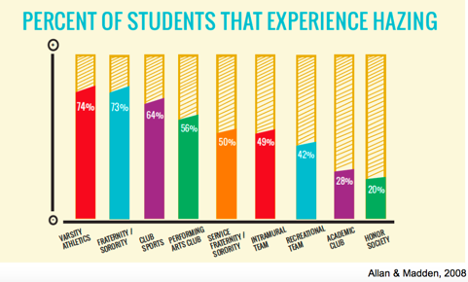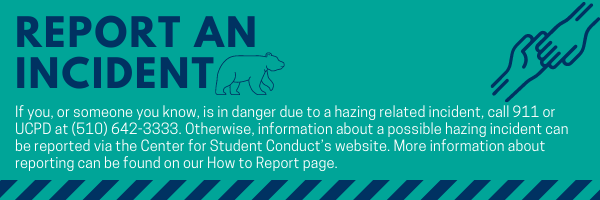Hazing Education, Prevention and Reporting at Berkeley
Acknowledging that hazing occurs and that it can cause harm is an important first step for hazing prevention. We all have a responsibility to make a difference by being informed about hazing and committing to hazing prevention. UC Berkeley is committed to providing a safe educational environment for everyone and does not tolerate hazing by any group or individual affiliated with the University. Berkeley students should expect all student organizations to treat them with respect and dignity. Hazing has no place in the Golden Bear experience or student organization culture. We support student health and well-being. We facilitate belonging, community, and leadership development. Above all, we foster compassion and care.
Below is some foundational knowledge about hazing. To learn more about hazing and how to prevent it, navigate to our Hazing Prevention Education and Training page.
What is Hazing?
UC Berkeley’s Code of Student Conduct defines hazing as:
Any intentional, knowing, or reckless act, activity, or method committed by a person (whether individually or in concert with other persons) against another person or persons, including current, former, or prospective students, regardless of the willingness of such other person or persons to participate, that is committed in the course of a preinitiation, an initiation into, an affiliation with, or the maintenance of membership in, an official or unofficial student organization or other student group that
(i) causes or creates a risk, above the reasonable risk encountered in the course of participation in the institution of higher education or the organization (such as the physical preparation necessary for participation in an athletic team), of physical or psychological injury, including personal degradation or disgrace, and/or
(ii) the person knew or should have known was likely to cause serious bodily injury.

When does an activity cross the line into hazing? The following three components are key to understanding hazing:
- Group context: Associated with the process for joining and maintaining membership in a group.
- Abusive behavior: Activities that are potentially humiliating and degrading, with potential to cause physical, psychological and/or emotional harm.
- Regardless of an individual’s willingness to participate: The “choice” to participate may be offset by the peer pressure and coercive/power dynamics that often exist in the context of gaining membership in a group.
Is This Hazing?

If you’re not sure whether or not something happening to you or to someone else is hazing, ask yourself these questions:
- Am I comfortable participating in this activity?
- Would we get in trouble if a school/college administrator walked by and saw us?
- Am I being asked to keep these activities a secret?
- Am I doing anything illegal?
- Does participation in this activity violate my values or those of this organization?
- How would I react if a friend told me they were being treated this way?
- Is this causing emotional or physical distress or stress to myself or to others?
